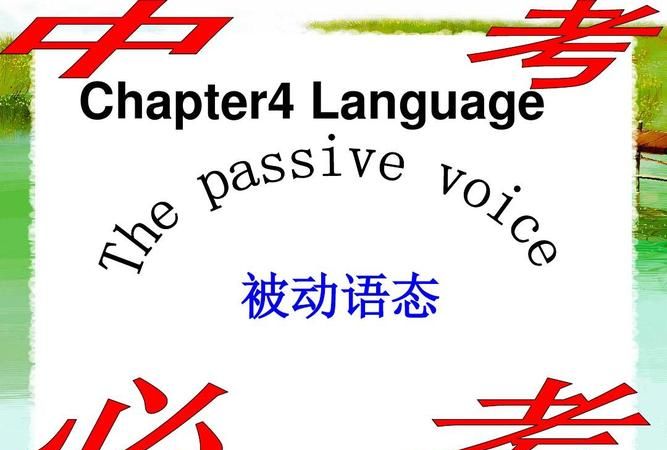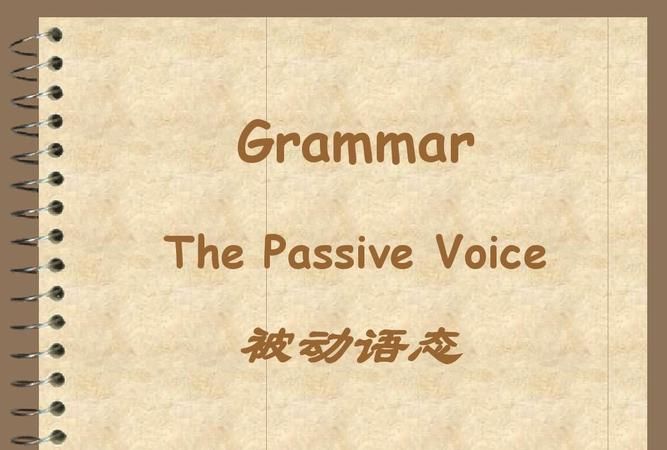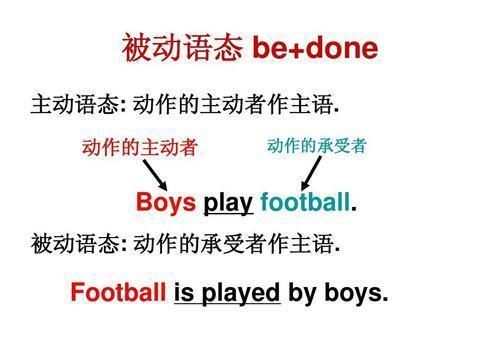本文目录
被动句式的基本句式
被动语态基本式:be+v-ed
后者为及物动词过去分词
,be动词在不同时态下有不同变化。由于动词过去分词确定,因此这个语态的变化就体现在be动词上。以下分别不同时态给出不同的be动词变化:
1、一般现在时:am/is/are
2、一般过去时:was/were
3、现在进行时:am/is/are
being
4、过去进行时:was/were
being
5、一般将来时:will
be
6、现在完成时:have/has
been
7、过去完成时:had
been
初中阶段应该主要就这几个,其中以前5个更为常见,当然还有情态动词的被动语态,如
can
be
v-ed
也常用的。
希望对楼主有用。

英语中的主动语态和被动语态,有什么区别
被动语态通常以物作主语,句子中会有be done的形式出现,有些基础点的后面还会加by.
主动语态就是一般以人做主语,没有be done的形式!
区别:被动的语句会有be done 的形式,物体为主语!
转换:就是被动的话,将里面的人和物的位置换了,不要be done的形式,动词依据句子的时态来!
主动句:主语+do+宾语 如 I play basketball
被动句:主语+be +done 如 the basketball is played by me

初中被动语态讲解优秀ppt
TENSE 主动语态 被动语态
一般现在时 be\V\Vs am\is\are+Vpp
一般将来时 will+V will be +Vpp
现在进行时 am\is\are+Ving am\is\are+being+Vpp
一般过去时 ①was\were②Ved was\were+Vpp
一般完成时 have\has+Vpp have\has+been+Vpp
过去完成时 had+Vpp had+been+Vpp
过去进行时 was\were+Ving was\were+being+Vpp
情态动词 can+V can+be+V
被动语态(一般现在时)
主动语态变被动语态时,主动语态句中的宾语变成被动语态句中的主语,主动语态句中的主语成为被动语态句中的动作的发出者。
被动语态的口诀:
一般现、过用be +V.过去分词,be有人称、时、数变。
完成时态have(has) done,被动将been加中间。
一般将来shall (will) do,被动变do为be done。
将来进行无被动,shall (will) be doing,
现在完成进行同,have (has) been doing。
现、过进行be doing, 被动be加being done。
情、助、有、是妥安排,一律随新主语变。
否定助后加not,疑问一助置主前。
主语恰是疑问词,直陈语序主在前。
一般情助加be done,双宾多将间宾变。
复合宾语宾变主,宾补、主补相应变。
1.一般现在时 is\am\are+P.P(过去分词)
2.一般过去时 was\were+P.P
3.一般将来时 will be+P.P
4.现在进行时 is\am\are+being(固定不变)+P.P
5.过去进行时 was\were+being(固定不变)+P.P
6.现在完成时 have\has been+P.P
7.过去完成时 had been+P.P
语法结构
1.if结构(非真实条件句——表示的是假设的或实际可能性不大的情况)
与..事实相反 If从句 主句
过去 Had done Would* have done
现在 Were/did Would* do
将来 Should do/were/were to do Would* do
"一干二听三让四看半帮助”要加to
例句:If there hadn’t been much rain in spring, we would have had a good harvest now. [过去]
If he smoked less, his cough might be well soon. [现在]
If the lecturer should be late, you would have to make a speech first. [将来]
备注
(1)上表中'*',would都可转换为should、could、might。
(2) 如果为时间错综句的话,左右两栏可互相搭配,排列组合。
例句:
He would still be alive today if he hadn’t taken that drug.
[与现在事实相反] [与过去事实相反]
(3) if可转换为其他形式
例句:Without your advice, our meeting wouldn’t have been so successfully. [过去]
(=>可转换为:If there hadn’t been your advice, we …)
Your notes are almost illegible (难以辨认的). Notes typed out would be a lot easier to read. [将来]
(=> 可转换为:If the notes had been typed out, it would be a lot easier to read.)
I should have gone to see Dr. Smith and he might have cured me of the disease.[过去]
(=> 可转换为:If he have gone to see Dr. Smith, he ..)
2、wish结构
与..事实相反
过去 Had done
现在 Were/did
将来 Would
备注:可转换为其他形式。
例句:He talks as if (好像) he had done all the work himself. [过去]
I wish I were a bird.
I wish he handn' done that.
I wish I would be rich in the future.
3、should结构
从句中用“should + 动词原形”构成。而且should可以省去。用于此结构的动词有:advise, direct, agree, ask, demand, decide, desire, insist, order, prefer, propose, request, suggest,intend等。
例句:The teacher suggest he (should) read English aloud.
注意:当insist表示“坚持认为”、suggest表示“表明,显示”时,不用虚拟语气。
例句:The look on his face suggested that he was quite satisfied with what I had done for him.
He insisted that he was honest.
4、would rather +从句
在这种结构中,从句的谓语动词用过去形式表示虚拟。
例句:I would rather you did this instead of me.
5、主语从句中的虚拟语气
1)It be + 形容词 + that ...(should)...
用于该句型的形容词是:necessary, good, important, right, wrong, better, natural, proper, funny,
strange, surprising .
一些名词也可以用于 在该结构中。如:a pity, no wonder....
2)It be + 过去分词 + that ...(should)....
用于该结构中的过去分词是表示“建议、请求、命令”等词的过去分词。如:desired, suggested, requested,
ordered, proposed等。
3)It is time(about time, high time)that ...(过去式动词形式或should+动词原形)....
It is high time I went home now. = It is high time I should go home now.
6、表语从句、同位语从句中的虚拟语气
在suggestion, proposal, order, plan, idea, advice, decision等需要有内涵的名词后面的表语从句、同
位语从句中,要使用虚拟语气。其谓语动词应用:should+原形动词。另外连接从句的that不能省
略。
例:My suggestion is that we should go there at once.
What do you think of his proposal that we should put on a play at the English evening?
第二句"be有人称、时、数变"即be有人称、时态和单、复数的变化。"情助"是指情态动词和助动词must,may,can,shall,will等一律随新主语(多是主动句中的宾语)来变化。"疑问一助置主前"是说有两个助动词的话,应把主语放在第一助动词之后或把第一助动词置于主语之前。下面详细举例说明之。
一般现、过用be done, be有人称、时、数变
例:1、主动:The children gave the foreign guests a warm welcome.
被动:The foreign guests were given a warm welcome by the children.
孩子们热烈地欢迎外宾。
2、主动:People regard him as brilliant.
被动:He is regarded as brilliant by people.
人们认为他很有才华。
以上两例都是一般时态用be done的例子,be有人称、时、数变,第三人称foreign friends是复数,时态一般过去时,所以"be done"就是were given,而People regard him as brilliant一句,被动后的"be done"就变成单数第三人称is regarded的形式了。
被动:
This speech was delivered by comrade Wang. (was delivered即一般过去时的被动态)
这篇讲演是王的发言。
There was a serious train accident near the border. Two people were killed and twelve were injured.
边境发生非常严重列车事故,两人死亡,十二人受伤。
A person who is truly honest is called a straight arrow. 直言不讳的人才是真正诚实的人。
A note was passed up to the speaker. 有人给讲演者递上来一张纸条。
John was elected president of the class instead of Harry. 乔治被选为班长而代替了亨利。
Volcanoes are described as active, dormant or extinct. 火山被描述为活的,沉睡着的,或者死的。
The soldier was killed, but the train was saved. 这位战士牺牲了,然而列车得救了。
He was thought to be clever but dishonest. 他被认为很聪明但不诚实。(别人认为他很聪明但不诚实)
The first zoological garden in the United States was established in 1874. 美国的第一个动物园是1874年建立的。
The information is urgently needed. 急需这个资料。
完成时态have done,被动将been加中间。
(过去完成时had done也包括在内)。
例:1、主动:We have studied English for 3 years off and on at the spare-time school.
被动:English has been studied for 3 years by us off and on at the spare-time school. (have随新主语变为has)
我们已经在夜校里断断续续地学了三年英语了。
2、主动: They had produced 100 tractors by the end of last year.
被动: 100 tractors had been produced by the end of last year.
到去年年底我们已生产出一百台拖拉机。
3、主动:They have set up a power station in their home town.
被动:A power station has been set up in their home town.
他们的家乡建立了一座发电站。
4、主动:They have warned us to be careful of rats.
被动:We have been warned to be careful of rats.
他们已提醒我们要注意老鼠。
5、主动:People have piled plastic bags full of rubbish in streets.
被动: Plastic bags full of rubbish have been piled in streets.
人们把装满垃圾的塑料袋子堆放在街上。
6、主动:We have used nuclear energy to produce electricity.
被动:Nuclear energy has been used to produce electricity.
核能已用来发电。 7、主动:No one has ever beaten him at tennis.
被动:He has never been beaten at tennis. 就网球来说还没有人是他的对手。 (No one涉及到全否定和部分否定问题,见否定一讲)
主动: Somebody had cleaned my shoes.
被动: My shoes had been cleaned by somebody.
有人早已把我的鞋子擦了。
When I returned I found that they had towed (toud) my car away, I asked why they had done this and they told me that id was because I had parked it under a "No Parking Sign".
被动:my car had been towed away. I asked why this had been done and told that ... it had been parked under a "No Parking Sign".
当我回来时,发现我的车被弄走了。我问他们为什么这么干。他们告诉我说因为我把车于停在"禁止停车"的禁区。
主动:They had build three ships by last December. 被动: By last December three ships had been built by them. 到去年年底他们已建造了三艘船。 Research had been centred on the improvement of natural building materials before synthetics were created. 合成材料造出之前,研究工作集中在改进天然建筑材料上。
He did not say if all those steel pipes had been examined.
他并没有说那些钢管都检验过没有。
After plastic had been created, engineers were given a much wide choice of materials.
塑料发明之后,工程师们在材料选择上有了更广阔的途径。
一般将来shall (will) do,被动变do为be done
即由shall do或will do变为shall done或will be done。
例:主动: We shall build several big modern power plants in our city next year. 被动:Several big modern power plants will be built in our city next year.
过年我市将建立几座大型现代化的发电厂。
(shall do中的shall要随新主语变为will, do为be done.)
主动:I shall send my second boy to school next September.
被动:My second boy will be sent to school next September. 过年九月我将送我次子去读书。 主动:In order to fool people cheaps and swindlers will make such bricks out of lead covering the "lead brick" with gold. 被动:Such bricks will be made out of lead covering the "lead brick" with gold by cheaps and swindlers. "铅砖"外面被设法骗钱的商人和骗子们镀上一层金来做这样的"金砖"。
主动:They will ask you a lot of strange questions.
被动: You will be asked a lot of strange questions.他们将问你许多怪题。
被动句中的by引出的宾语,一般说来,如果是人称代词你、我、他等,均可省略,someone no one不由by来引出。如果是名词不能省略,但当今英语也都可省略了。
主动:The Chinese people will make more space explorations in the future.
被动:More space explorations will be made in the future by the Chinese people. 中国人民在将来将进行更多的空间探索。
同样
Will more gas be needed? 需要更多的煤气吗?
但如果是一般过去将来时如何处理呢?请记下面口诀:
一般过去将来时,过去某时将发生。
主动should (would) do,被动be done代原形。
将来进行无被动,现在完成进行同。
主动:A few days ago we were still not quite sure whether we should carry out the new plan ahead of time. 被动:...whether the new plan would be carriedout ahead of time. 几天前,我们还不能肯定能否提前执行新的计划。
主动:I did not say that we would change the equipment. 被动:I did not say that the equipment would be changed. 我并没说过,我们将换掉那台设备。
将来进行无被动,shall (will) be doing,
现在完成进行同.have (has) been doing,
即将来进行时表示动作在将来某一时刻或某个阶段正在进行'现在完成进行时表示某-行为发生在过去.延续到现在,可能还要延续下去。两种时态则不用被动语态。
例;We hope your comany will soon be sending an engineer over to check this equipment. (将来进行时) 我们希望贵公司早些派一名工程师来检查这台设备。
In a ffew minutes our passenger plane will be flying in the stratosphere. (将来进行时) 几分钟后我们的客机将在同温层中飞行。
现、过进行be doing,被动be加being done
即现在进行时或过去进行时都是be的人称、时和数的形式加doing。而被动态则是be加上being done的形式,being是不变的。现在进行时和过去进行时的被动态是被动态个的重点,容易搞错。 情、助、有、是妥安排,一律随新主语变。
带情态动词和助动词等的被动态如何处理比较复杂。要随新的主语来变化,这些词如can, could;will, would; shall, should; may, might; must; ought to; need需要;have to不得不;be going to; to be to; used to; seem to; happen to等。例如: 主动: We must keep this in mind. 被动:This must be kept in mind.
我们必须把这个记在心里。
主动:We can put the refrigerator in that place. (refrigerator=freezer.) 被动:The refrigerator can be put in that place. 我们可以把电冰箱放在那个地方。
主动:We shall not use the washing machine again.
被动:The washing machine will not be used again.
我们不能再用那台洗衣机了。 原来的谓语shall use被动态中随新主语变为will.
主动: We shall take more measures to prevent corrosion.
被动: More measures will be taken to prevent corrosion. (shall变will)
我们将采取更多的措施来防止腐蚀。
再如: 主动:We shall have to adopt a different attitude. 被动:A different attitude will have to be adopted. 我们将不得不采取另一种态度.
主动:You are to leave the bag here. 被动: The bag is to be left here. (are to随新主语变为is to) 你应把包裹放在这儿。
主动:They used to start these engines by hand. 被动:These engines used to be started by hand. 过去他们用手启动马达。
主动: We are going to paint the wall green. 被动:The all is going to be painted green. 我们打算把墙刷成绿色。 主动:You needn't type this letter. 被动:This letter need not be typed. (ought to, need是不变助动词) 你不必把这封信打字。
主动:You should have taken those books back to the library.
被动:Those books should have been taken back to the library.
你本该把这些书带回图书馆去。 主动:They may have left it in the sun. 被动:It may have been left in the sun. 他们可能已把它放在阳光下了。
may加不定式的完成体或完成进行体表示"可能",主要用于肯定句,决不能用于疑问句。而can与不定式的完成体或完成进行体连用表示"可能",只用于否定句和疑问句,不用于肯定句。但如果can或may的过去式即could与might与不定式完成体或完成进行体搭配时,可用于各种结构。肯,否,陈,疑均可。
It can't have been lost in the post, can it?
它不可能在邮局丢失的吧:(反意疑问句)
否定助后加not,疑问一助置主前
在否定句的被动态中,否定副词not-定加在第一助动词之后,不放在别的助动词之后。同样在疑问句的被动态中,第一助动词置于主语之前。
例:Why has(一助) not anything been(二助) done to end the strike?
not必须放在第一助动词has之后,第-助动词has必须放在主语anything之前。决不可写成: why has fot been anything done to end the strike?或why has been not anything done to end the strike? 为什么不采取些措施来结束罢工呢? The exercises will not be done in class. 不可写成:The exercise will be not done in class. 我们将不在课堂上作练习。 Why had he been imprisoned? 他为何入狱的?
主语恰是疑问词,直陈语序主在前 凡主语恰好是一个疑问词或由疑问词来修饰主语时,后面要用陈述语序。
What measures(主语) are being taken to develop this new science? (主语为疑问词what所修饰)
正在采取什么措施来发展这门新科学?
What kind of device(主语) is needed to make the control system simple? (主语为疑问词所修饰) 需要什么装置来使控制系统简化? what has been done to improve the techniques? 采取了什么措施来改进这些技术的? (what恰是句子的主语) 应指出的是有的学生把We study diligently和She could see herself clearly in the mirror.都硬行变成被动了, 殊不知不及物动词通常是没有被动态的。关于不及物动词.反身代词动词,同源宾语动词.系词.感官使役动词,短语动词的被动态。
主动句变为被动句所遵循的4个步骤:
1.把原主动句中的宾语变为被动句的主语
2.把动词变为被动形式即be +过去分词,并注意其人称和数随主语的变化,而动词的时态则保持不变。3.原主动句的主语如需要则放在by后面以它 的宾格形式出现(注代词的宾格),如不需要则可省略。 4.其它的成分(定语、状语)不变。 不用被动语态的情况

小学英语语法完全突破 视频 35集
《【学而思】小学英语语法精讲:视频+专项练习题(共28讲)》百度网盘资源免费下载
链接:***/s/1CnYd3G3cBlwKlN8xX_82Pg
【学而思】小学英语语法精讲:视频+专项练习题(共28讲)|学而思语法系列之五大句型(5讲)|学而思语法系列之三大从句(5讲)|学而思语法系列之六大时态(6讲)|学而思词法大全(12讲)|学而思被动语态(2讲)|[第2讲] 被动语态知多少(二)——拔高篇|[第1讲] 被动语态知多少(一)——基础篇|6-被动语态知多少(一)——基础篇第六段.mp4|5-被动语态知多少(一)——基础篇第五段.mp4|4-被动语态知多少(一)——基础篇第四段.mp4|3-被动语态知多少(一)——基础篇第三段.mp4|2-被动语态知多少(一)——基础篇第二段.mp4|1-被动语态知多少(一)——基础篇第一段.mp4|4-被动语态知多少(二)——拔高篇第四段.mp4

以上就是关于被动语态趣味视频,被动句式的基本句式的全部内容,以及被动语态趣味视频 的相关内容,希望能够帮到您。

